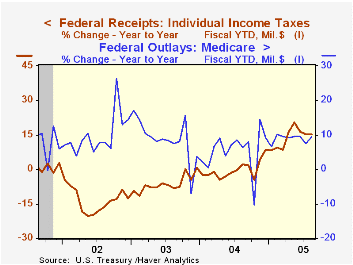 Global| Sep 14 2005
Global| Sep 14 2005U.S. Budget Deficit Deepened Due To Widespread Spending
by:Tom Moeller
|in:Economy in Brief
Summary
In August, the U.S. federal government ran a budget deficit of $50.0B. That was slightly deeper than Consensus estimates but it was quite a bit deeper than a $41.1BB deficit last August. Nevertheless, the deficit of $352.6B during the [...]

In August, the U.S. federal government ran a budget deficit of $50.0B. That was slightly deeper than Consensus estimates but it was quite a bit deeper than a $41.1BB deficit last August. Nevertheless, the deficit of $352.6B during the first eleven months of FY 2005 was 19% lower than the prior fiscal year's first eleven months.
Overall, U.S. net outlays grew 6.8% during the first eleven months of FY05. A 20.3% y/y gain in federal outlays on defense (19% of total outlays) counted for much of the deterioration in the deficit picture versus last August. That rise lifted defense spending by 7.3% in fiscal year 2005 versus 2004. Medicare spending (12% of total outlays) also popped 29.6% versus August of 2004 and FYTD growth accelerated to 9.4%. Growth in spending on social security (21% of total outlays) was about stable at 5.6% though spending on health programs (10% of the total) picked up a bit to 4.4%. Spending on education & training (4% of the total) surged 51% versus last August and grew 15.3% FYTD while interest expense (8% of the total) grew 11.7% with higher interest rates versus declines last year.
Net receipt growth at 13.7% during the first eleven months of FY05 continued to reflect the improved economy. Individual income taxes (44% of total receipts) rose 15.3% and corporate income taxes (10% of total receipts) rose 41.3%. The improved job market raised employment taxes (36% of total receipts) by 8.1%.
Do Productivity Growth, Budget Deficits, and Monetary Policy Actions Affect Real Interest Rates? Evidence From Macroeconomic Announcement Data from the Federal Reserve Bank of St. Louis is available here.
| US Government Finance | Aug | July | FY '05 - YTD | FY2004 | FY2003 | FY2002 |
|---|---|---|---|---|---|---|
| Budget Balance | $-50.0B | $52.8B | $-352.6B | $-412.1B | $-377.6B | $-157.8B |
| Net Revenues | $155.4B | $142.1B | 13.7% | 5.5% | -3.8% | -6.9% |
| Net Outlays | $205.4B | $194.9B | 6.8% | 6.1% | 7.4% | 7.9% |
Tom Moeller
AuthorMore in Author Profile »Prior to joining Haver Analytics in 2000, Mr. Moeller worked as the Economist at Chancellor Capital Management from 1985 to 1999. There, he developed comprehensive economic forecasts and interpreted economic data for equity and fixed income portfolio managers. Also at Chancellor, Mr. Moeller worked as an equity analyst and was responsible for researching and rating companies in the economically sensitive automobile and housing industries for investment in Chancellor’s equity portfolio. Prior to joining Chancellor, Mr. Moeller was an Economist at Citibank from 1979 to 1984. He also analyzed pricing behavior in the metals industry for the Council on Wage and Price Stability in Washington, D.C. In 1999, Mr. Moeller received the award for most accurate forecast from the Forecasters' Club of New York. From 1990 to 1992 he was President of the New York Association for Business Economists. Mr. Moeller earned an M.B.A. in Finance from Fordham University, where he graduated in 1987. He holds a Bachelor of Arts in Economics from George Washington University.
More Economy in Brief
 Global| Feb 05 2026
Global| Feb 05 2026Charts of the Week: Balanced Policy, Resilient Data and AI Narratives
by:Andrew Cates






